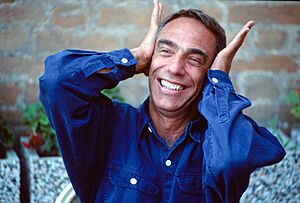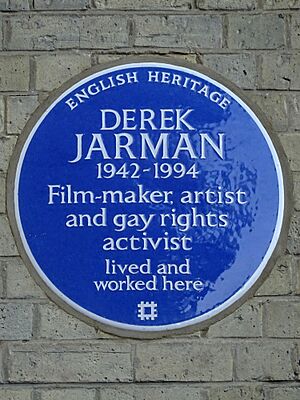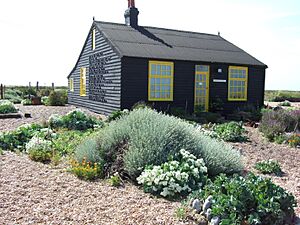Derek Jarman facts for kids
Quick facts for kids
Derek Jarman
|
|
|---|---|

Jarman during the 1991 Venice Film Festival
|
|
| Born | 31 January 1942 |
| Died | 19 February 1994 (aged 52) St Bartholomew's Hospital, London, England
|
| Resting place | St Clement Churchyard, Old Romney, Kent |
| Education | Canford School, Dorset |
| Alma mater | King's College London Slade School of Fine Art (UCL) |
| Occupation | Film director, gay rights activist, gardener, set designer |
| Years active | 1970–1994 |
|
Notable work
|
Sebastiane (1976) Jubilee (1977) The Tempest (1979) Caravaggio (1986) The Last of England (1988) War Requiem (1989) Edward II (1991) Wittgenstein (1993) Blue (1993) |
| Style | New Queer Cinema |
| Partner(s) | Philip Macdonald (1980–1988) Keith Collins (1987–1994; his death) |
Derek Jarman (born January 31, 1942 – died February 19, 1994) was a talented English artist, filmmaker, writer, and gardener. He was also known for speaking up for fairness and understanding for all people.
Contents
About Derek Jarman
Derek Jarman was born in Northwood, Middlesex, England. His father was a Royal Air Force officer from New Zealand.
He went to Canford School in Dorset. Later, he studied English and art at King's College London. After that, he spent four years at the Slade School of Fine Art. In the 1970s, he had a studio at Butler's Wharf in London.
In 1986, Jarman learned he had a serious health condition. He spoke openly about it. His illness led him to move to Prospect Cottage in Dungeness, Kent. He passed away in London in 1994 at the age of 52 due to his illness. He was buried in Old Romney, Kent.
In his later years, Derek Jarman was supported by his friend Keith Collins. Jarman left his special home, Prospect Cottage, to Keith. A special blue plaque was put up at Butler's Wharf in London in 2019 to remember Jarman.
Derek Jarman's Films
Jarman started making films using small Super 8mm cameras. He continued to use this style in films like Imagining October (1984) and The Angelic Conversation (1985). He also used it in The Last of England (1987) and The Garden (1990).
Early Film Work
Jarman first became known for designing sets for plays. His big break in movies came when he worked as a production designer for Ken Russell's film The Devils (1971).
His first major film as a director was Sebastiane (1976). This movie was about a saint named Saint Sebastian. It was one of the first British films to show positive images of people who were different. The film's dialogue was entirely in Latin.
He then made Jubilee (1978). In this film, Queen Elizabeth I travels through time to a harsh future. Jubilee is often called "Britain's only decent punk film." It featured famous punk artists like Jayne County and Toyah Willcox.
In 1979, he directed a film version of Shakespeare's play The Tempest.
Films of the 1980s
During the 1980s, Jarman was a strong voice against rules that tried to limit discussions about different lifestyles in schools. He also worked to raise awareness about health challenges. His art during this time showed these beliefs. For example, in The Angelic Conversation (1985), the images are paired with Judi Dench reading Shakespeare's sonnets.
Jarman spent seven years trying to get his film Caravaggio made. He rewrote the script many times. When it was released in 1986, Caravaggio reached a wider audience. It is still one of his most famous works, partly because Channel 4 helped fund it. This film marked a new period in his career. From then on, TV companies often helped fund his movies.
Caravaggio was also the first time Jarman worked with actress Tilda Swinton. The film showed deep emotions and brought famous paintings to life. It won an award at the Berlin International Film Festival.
After Caravaggio, Jarman decided to move away from traditional storytelling for a while. He felt frustrated by the slow process of making big films. He went back to his Super 8mm style.
The first film from this new phase was The Last of England. This movie showed a country struggling with changes and economic problems. Critics called it "wrenchingly beautiful."
In 1989, Jarman's film War Requiem brought famous actor Laurence Olivier out of retirement. It was Olivier's last movie role. The film used Benjamin Britten's anti-war music and combined scenes of war with powerful poetry.
Later Films
While making his film The Garden (1990), Jarman became very ill. Even though he recovered enough to finish it, he made smaller films after that. These included Edward II (1991), which was very political, and Wittgenstein (1993), a gentle comedy about the philosopher Ludwig Wittgenstein.
Jarman also directed music videos for artists like Marianne Faithfull, The Smiths, and the Pet Shop Boys.
By the time he made his 1993 film Blue, Jarman was losing his sight and was very unwell. Blue is a unique film. It shows only a single shot of blue color on the screen. Over this, Jarman describes his life and thoughts. When it was shown on British TV, the image was on one channel, and the sound was on another. Blue is now in important art collections around the world.
His very last film was Glitterbug (1994). It was a collection of his Super-8 short films with music by Brian Eno. It was shown shortly after Jarman passed away.
Other Creative Works
Derek Jarman also helped create and expand the idea of the 'pop video' in England. For example, he used old home movie footage from his father for an early music video. He was also a strong voice for fairness for all people.
Jarman directed the 1989 tour for the music group Pet Shop Boys. It was a very theatrical show with costumes and special films for each song. He also directed an opera in Florence in 1988.
Jarman is also famous for his unique garden at Prospect Cottage. He created it in his final years, near the Dungeness nuclear power station. The cottage is made of wood, like other local buildings. On its side, there are words from a poem by John Donne.
The garden itself was made by arranging items washed up from the sea. He mixed these with plants that naturally grow on the beach. This created a beautiful contrast against the bright shingle. Many books have been written about his garden. During this time, Jarman also started painting again.
In 2020, the Garden Museum in London held an exhibition about Derek Jarman's garden. Parts of his garden and Prospect Cottage were recreated for the show.
Jarman wrote several books, including his autobiography, Dancing Ledge (1984). This book tells about his life up to age 40. He shared his experiences of living in London and discussed the challenges of being a filmmaker. He also wrote poetry, diaries, and books about his film and art work.
Musical Tributes
After Derek Jarman's passing, several musicians created songs and albums in his honor. The band Chumbawamba released "Song for Derek Jarman." Andi Sexgang released the CD Last of England as a tribute. Robin Rimbaud's album The Garden Is Full of Metal included parts of Jarman's speeches.
Nicky Wire, the bassist for Manic Street Preachers, recorded a song called "Derek Jarman's Garden." Ambient composer Harold Budd also featured a song titled "The Art of Mirrors (after Derek Jarman)" on his album In the Mist.
The band Coil, who made music for Jarman's film The Angelic Conversation, released a single called "Themes for Derek Jarman's Blue." In 2018, composer Gregory Spears created a piece for chorus and string quartet inspired by a poem about Jarman.
In 2020, French musician Romain Frequency released his album Research on a nameless colour. This album was a tribute to Jarman's final book, Chroma, which he wrote while losing his sight.
Filmography
Feature films
- Sebastiane (1976)
- Jubilee (1978)
- The Tempest (1979)
- The Angelic Conversation (1985)
- Caravaggio (1986)
- The Last of England (1987)
- War Requiem (1989)
- The Garden (1990)
- Edward II (1991)
- Wittgenstein (1993)
- Blue (1993)
Short films
- Studio Bankside (1971)
- Electric Fairy (1971)
- Garden of Luxor (aka Burning the Pyramids 1972)
- Burning the Pyramids (1972)
- Miss Gaby (1972)
- A Journey to Avebury (1971)
- Andrew Logan Kisses the Glitterati (1972)
- At Low Tide (1972)
- Tarot (aka the Magician, 1972)
- Art of Mirrors (1973)
- Sulphur (1973)
- Stolen Apples for Karen Blixen (1973)
- Ashden's Walk on Møn (1973)
- Miss World (1973)
- The Devils at the Elgin (aka Reworking the Devils, 1974)
- Fire Island (1974)
- Duggie Fields (1974)
- Ulla's Fete (aka Ulla's Chandelier, 1975)
- Picnic at Ray's (1975)
- Sebastiane Wrap (1975)
- The Making of Sebastiane (1975)
- Sea of Storms (1976)
- Sloane Square: A Room of One's Own (1976)
- Gerald's Film (1976)
- Art and the Pose (1976)
- Houston Texas (1976)
- Jordan's Dance (1977)
- Every Woman for Herself and All for Art (1977)
- The Pantheon (1978)
- In the Shadow of the Sun (1974)
- T.G.: Psychic Rally in Heaven (1981)
- Jordan's Wedding (1981)
- Waiting for Waiting for Godot (1982)
- Pontormo and Punks at Santa Croce (1982)
- B2 Tape (1983)
- The Dream Machine (1983)
- Witches Song (1979)
- Broken English (1979)
- Ballad Of Lucy Jordan (1979)
- Pirate Tape (1983)
- T.G.: Psychic Rally In Heaven (1981).
- Imagining October (1984)
- Pirate Tape (William S. Burroughs Film) (1987)
- Aria (1987)
- segment: Depuis le Jour
- L'Ispirazione (1988)
- Coil: Egyptian Basses (1993)
- The Clearing (1994)
- Glitterbug (1994)
- Will You Dance With Me?" (2014)
Music videos
- The Sex Pistols: The Sex Pistols Number One (1977)
- Marianne Faithfull: "Broken English", "Witches' Song", and "The Ballad of Lucy Jordan" (1979)
- Throbbing Gristle: "TG Psychic Rally in Heaven" (1981)
- The Lords of the New Church: "Dance With Me" (1983)
- Carmel: "Willow Weep for Me" (1983)
- Wang Chung: "Dance Hall Days" (first version) (1983)
- Psychic TV Jordi Valls: "Catalan" (1984)
- Language: "Touch The Radio Dance" (1984)
- Wide Boy Awake Billy Hyena (1984)
- Orange Juice: "What Presence?!" (1984)
- Marc Almond: "Tenderness Is a Weakness" (1984)
- Bryan Ferry: "Windswept" (1985)
- The Smiths:
- The Queen Is Dead, a short film (1986)
- "Panic" (1986)
- "Ask" (1986)
- Easterhouse: "1969" and "Whistling in the Dark" (1986)
- Matt Fretton: "Avatar" (unreleased) (1986)
- The Mighty Lemon Drops "Out of Hand" (1987)
- Bob Geldof: "I Cry Too" and "In The Pouring Rain" (1987)
- Pet Shop Boys: "It's a Sin" (1987), "Rent" (1987), several concert projections (1993), and "Violence" (1995)
- Suede: "The Next Life" (1993)
- Patti Smith: "Memorial Tribute" (1993)
Scenic Design
Derek Jarman also designed sets for plays and films:
- Jazz Calendar at Covent Garden
- Don Giovanni at the Coliseum
- The Devils, directed by Ken Russell
- Savage Messiah, directed by Ken Russell
- The Rake's Progress, directed by Ken Russell in Florence
- 1991: Waiting for Godot by Samuel Beckett in London's West End
Images for kids
 | Percy Lavon Julian |
 | Katherine Johnson |
 | George Washington Carver |
 | Annie Easley |




